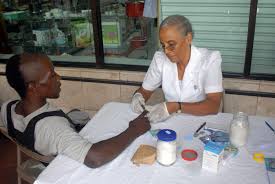High Blood Sugar Symptoms
Cause of High Blood Sugar
High Blood Sugar (Hyperglycemia) Topic Guide – eMedicineHealth
www.emedicinehealth.com › … › high blood sugar hyperglycemia article
Whenever the glucose (sugar) level in one’s blood rises high temporarily, this condition is known as hyperglycemia. The opposite condition, low blood sugar, is called hypoglycemia.
Glucose comes from most foods, and the body uses other chemicals to create glucose in the liver and muscles. The blood carries glucose (blood sugar) to all the cells in the body. To carry glucose into the cells as an energy supply, cells need help from insulin. Insulin is a hormone made by the pancreas, an organ near the stomach.
The pancreas releases insulin into the blood, based upon the blood sugar level. Insulin helps move glucose from digested food into cells. Sometimes, the body stops making insulin (as in type 1 diabetes), or the insulin does not work properly (as in type 2 diabetes). In diabetic patients, glucose does not enter the cells sufficiently, thus staying in the blood and creating high blood sugar levels.
 Blood sugar levels can be measured in seconds by using a blood glucose meter, also known as a glucometer. A tiny drop of blood from the finger or forearm is placed on a test strip and inserted into the glucometer. The blood sugar (or glucose) level is displayed digitally within seconds.
Blood sugar levels can be measured in seconds by using a blood glucose meter, also known as a glucometer. A tiny drop of blood from the finger or forearm is placed on a test strip and inserted into the glucometer. The blood sugar (or glucose) level is displayed digitally within seconds.
Blood glucose levels vary widely throughout the day and night in people with diabetes. Ideally, blood glucose levels range from 90 to 130 mg/dL before meals, and below 180 mg/dL within 1 to 2 hours after a meal. Adolescents and adults with diabetes strive to keep their blood sugar levels within a controlled range, usually 80-150 mg/dL before meals. Doctors and diabetes health educators guide each patient to determine their optimal range of blood glucose control.
When blood sugar levels remain high for several hours, dehydration and more serious complications can develop. Moreover, even mild hyperglycemia (a fasting blood sugar over 109 mg/dL in adolescents/adults or over 100 mg/dL in children before puberty) – when unrecognized or inadequately treated for several years – can damage multiple tissues in the brain, kidneys, and arteries. When hyperglycemia is associated with the presence of ketones in the urine, this state demands immediate medical attention. When blood sugar levels rise and stay high (over 165 mg/dL consistently) for days to weeks, diabetes should be suspected and treatment initiated.
High blood sugar level fluctuations occur daily in people with diabetes. It is important to control blood sugar levels through diet, exercise, and medication (if prescribed), to know the symptoms of elevated blood sugar, and to seek treatment, when necessary.
What Causes High Blood Sugar And What Harm Can It Do To My …
abcnews.go.com/Health/DiabetesOverview/story?id=3843485
Diabetes is a condition where the glucose or sugar levels are too high in the blood. Now, there are many reasons why the blood sugar levels get too high in people with diabetes, but I will only mention the two main defects now.
The first is that the pancreas, which is an important endocrine organ in our bodies, does not secrete enough insulin. Insulin is the hormone that helps glucose go from the bloodstream into the cells of our body to be used for energy.
A complicated condition called insulin-resistance is the second main cause of diabetes. Insulin-resistance, which occurs primarily in type 2 diabetes, is when the cells of our body are resistant to the glucose-lowering effects of insulin. If an individual has either not enough insulin and/or insulin-resistance, then high blood sugar levels or diabetes will be present.
High blood sugar levels if untreated will cause short-term effects and long-term complications. High blood sugar levels over the short term do not cause any damage to the organs of your body, however they will cause you to feel tired and weak, be thirsty, and urinate a lot, be susceptible to infections and have blurry vision.
In fact in the elderly, high blood sugar levels can lead to dehydration, electrolyte imbalance, and lead to falls and of course we know getting a broken hip as an elderly individual can be pretty devastating.
High Blood Sugar Symptoms
Symptoms of High Blood Sugar-Topic Overview
High blood sugar (hyperglycemia) is most often seen in people who have diabetes that isn’t well controlled. The symptoms of high blood sugar can be mild, moderate, or severe.
Mild high blood sugar
If your blood sugar levels are consistently higher than your target range (usually 200 milligrams per deciliter (mg/dL) to 350 mg/dL in adults and 200 mg/dL to 240 mg/dL in children), you may have mild symptoms of high blood sugar. You may urinate more than usual if you are drinking plenty of liquids. Some people who have diabetes may not notice any symptoms when their blood sugar level is in this range. The main symptoms of high blood sugar are:
- Increased thirst.
- Increased urination.
- Weight loss.
- Fatigue.
- Increased appetite.
Hyperglycemia: When Your Blood Glucose Level Goes Too High …
Hyperglycemia means high (hyper) glucose (gly) in the blood (emia). Your body needs glucose to properly function. Your cells rely on glucose for energy. Hyperglycemia is a defining characteristic of diabetes—when the blood glucose level is too high because the body isn’t properly using or doesn’t make the hormone insulin.
High Blood Sugar Symptoms
If you’ve had diabetes for any length of time at all, you’ve probably seen lists of the signs and symptoms of high blood glucose dozens of times. Doctors and diabetes educators hand them out. Hundreds of websites reprint them. Most diabetes books list them. You likely know some of the items on the list by heart: thirst, frequent urination, blurry vision, slow healing of cuts, and more.
But have you ever stopped to wonder why these symptoms occur? How does high blood glucose cause frequent urination, make your vision go blurry, or cause all of those other things to happen? Here are some answers to explain what’s going on in your body when you have high blood glucose.
What Does High Blood Sugar Feel Like?
When your blood sugar levels goes to high there can be many reasons for this. You may find that not following a strictly controlled diet or by missing taking your medication will cause an increase in levels. People may ask what does high blood sugar feel like?
The variety of symptoms are vast and it is recommended that you become familiar with them and keep an eye out for any change.
You may feel more hungry than usual as you are retaining high levels of glucose. Increased thirst and feeling extra thirsty are common symptoms. You will urinate more often due to the increase of high blood sugar levels.
The vision can become blurred due to glucose and water infiltrating the lens in the eyeball. Being moody is another symptom that the high blood sugar level can cause.
A change in the balance of the electrolytes in your blood may cause muscular cramping. You may find it difficult to concentrate on anything and not be able to carry out your work as well.
Re current infections, particularly bladder infections and yeast infections can occur. Changes in the nerves may cause your hands and feet to tingle.
Any wounds or open lesions that you may get could potentially take longer to heal and need careful monitoring. Dryness of the mouth and skin along with itching of the skin can occur. Any of the symptoms above need evaluation by a doctor and given the appropriate treatment or medication.
